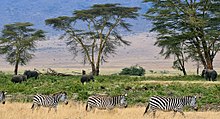Courtesy : Business engaged in environmental protection
Tanzania
Many constitutions acknowledge Tanzania as having some of the greatest biodiversity of any African country. Almost 40% of the land has been established into a network of protected areas, including several national parks.The concerns for the natural environment include damage to ecosystems and loss of habitat resulting from population growth, expansion of subsistence agriculture, pollution, timber extraction and significant use of timber as fuel. # ISO certification in India
Environmental protection in Tanzania began during the German occupation of East Africa (1884-1919)—colonial conservation laws for the protection of game and forests were enacted, whereby restrictions were placed upon traditional indigenous activities such as hunting, firewood collecting, and cattle grazing. In 1948, Serengeti has officially established the first national park for wild cats in East Africa. Since 1983, there has been a more broad-reaching effort to manage environmental issues at a national level, through the establishment of the National Environment Management Council (NEMC) and the development of an environmental act.# ISO certification in India

Zebras at the Serengeti savana plains in northern part of Tanzania
Division of the biosphere is the main government body that oversees protection. It does this through the formulation of policy, coordinating and monitoring environmental issues, environmental planning and policy-oriented environmental research. The National Environment Management Council (NEMC) is an institution that was initiated when the National Environment Management Act was first introduced in year 1983. This council has the role to advise governments and the international community on a range of environmental issues. The NEMC the following purposes: provide technical advice; coordinate technical activities; develop enforcement guidelines and procedures; assess, monitor and evaluate activities that impact the environment; promote and assist environmental information and communication; and seek advancement of scientific knowledge. # ISO certification in India
The National Environment Policy of 1997 acts as a framework for environmental decision making in Tanzania. The policy objectives are to achieve the following:
- Ensure sustainable and equitable use of resources without degrading the environment or risking health or safety.
- Prevent and control degradation of land, water, vegetation and air.
- Conserve and enhance natural and man-made heritage, including biological diversity of unique ecosystems.
- Improve condition and productivity of degraded areas.
- Raise awareness and understanding of the link between environment and development.
- Promote individual and community participation.
- Promote international cooperation.
- Use ecofriendly resources.
Tanzania is a signatory to a significant number of international conventions including the Rio Declaration on Development and Environment 1992 and the Convention on Biological Diversity 1996. The Environmental Management Act, 2004, is the first comprehensive legal and institutional framework to guide environmental-management decisions. The policy tools that are parts of the act include the use of environmental-impact assessments, strategics environmental assessments, and taxation on pollution for specific industries and products. The effectiveness of shifting of this act will only become clear over time as concerns regarding its implementation become apparent based on the fact that, historically, there has been a lack of capacity to enforce environmental laws and a lack of working tools to bring environmental-protection objectives into practice. # ISO certification in India